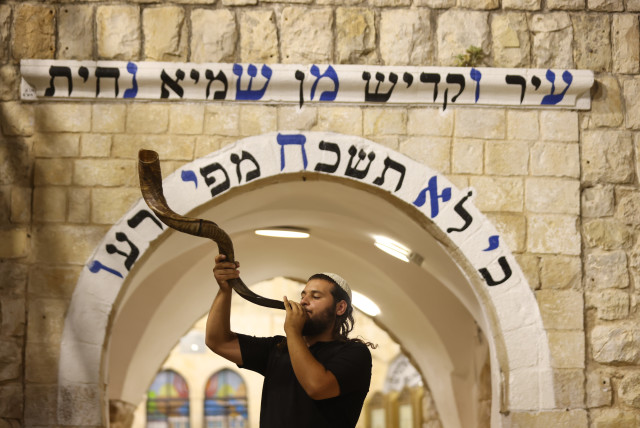Rosh Hashanah: Going from judgment to mercy

Blowing the shofar is an opportunity for each and every one of us to start the new year with mercy rather than strict judgment.
Rosh Hashanah marks the beginning of the High Holy Days of the month of Tishrei: Rosh Hashanah, Yom Kippur, and Sukkot. Each of these holidays has its own special character, and each one is designed to instill in us an important religious insight that will accompany us throughout the year. We must extract these insights from the commandments we observe during each holiday.
The central commandment of Rosh Hashanah is blowing the shofar (although this year, when the first day of Rosh Hashanah falls on Shabbat, the shofar is blown only on the second day of the holiday); on Yom Kippur, we fast and repent; and on Sukkot, we sit in a sukkah and bless the Four Species. Each of these commandments carries content, an idea, and a message through which we are called upon to deepen our understanding.
So, what is the significance of blowing the shofar on Rosh Hashanah? Why, on the first day of the Hebrew year, do we take the shofar and make loud sounds? What does this express?
Why do we blow the shofar?
Jewish sages have written many explanations for blowing the shofar, among them the following description: “When Israel blows their shofars and sounds them before the Holy One, blessed be He, He stands up from the throne of judgment and sits on the throne of mercy, and He fills with mercy and compassion for them, and He turns the attribute of judgment into mercy (Midrash Vayikra Rabbah, 29).
The background to this description are the words of our sages, rooted in the Bible, that Rosh Hashanah is the Day of Judgment, a day when God examines all of humanity and judges them. The Midrash explains that blowing the shofar is meant to arouse mercy for the Jewish people. Before we clarify how the blowing of the shofar awakens God’s mercy, we should first ask: Do we expect God to have mercy on us? Generally, people are not pleased when they are pitied. Why don’t we try to win the judgment in a way that doesn’t involve mercy?
The answer to this question is that the mercy we are talking about here is not the kind of mercy that stems from the pitiful state of a person.
To clarify the nature of this mercy, we can think about family relationships, where we don’t expect each family member to act strictly according to rules. In a family, different rules apply. There’s a greater degree of acceptance and consideration. These are relationships of mercy, which are not bound by the law but operate out of love and emotional closeness.
Rosh Hashanah is indeed a day of judgment when God examines all people, their deeds in the past, and their plans for the future. However, the manner of judgment – whether it will be with the attribute of judgment or the attribute of mercy – depends on us.
How is the blowing of the shofar related to this?
In the Bible, shofar blowing occurs in various contexts, including the anointing of a king. This is one of the essential meanings, perhaps the central one, of blowing the shofar on Rosh Hashanah. Through the blowing of the shofar, we declare our desire to accept God’s sovereignty. In simpler terms, this declaration expresses our consent to obey God’s laws as they appear in the Torah.
But, on a deeper level, it is an expression of faith and confidence. We express our faith in God and our desire for Him to rule over us. This declaration of faith creates a different relationship between us and God, a relationship that is not characterized by strict judgment but rather by the attribute of mercy which expresses mutual closeness and trust.
Rosh Hashanah is an opportunity that recurs every year and offers each person the chance to renew his or her relationship with God, to change it from connecting to the attribute of judgment to that of mercy, from alienation to closeness. Blowing the shofar is an opportunity for each and every one of us to start the new year with mercy rather than strict judgment.
May it be for all of us a good and sweet year, a year of happiness and peace, joy, health, and contentment.■
The writer is rabbi of the Western Wall and Holy Sites.
Jerusalem Post Store
`; document.getElementById("linkPremium").innerHTML = cont; var divWithLink = document.getElementById("premium-link"); if (divWithLink !== null && divWithLink !== 'undefined') { divWithLink.style.border = "solid 1px #cb0f3e"; divWithLink.style.textAlign = "center"; divWithLink.style.marginBottom = "15px"; divWithLink.style.marginTop = "15px"; divWithLink.style.width = "100%"; divWithLink.style.backgroundColor = "#122952"; divWithLink.style.color = "#ffffff"; divWithLink.style.lineHeight = "1.5"; } } (function (v, i) { });

